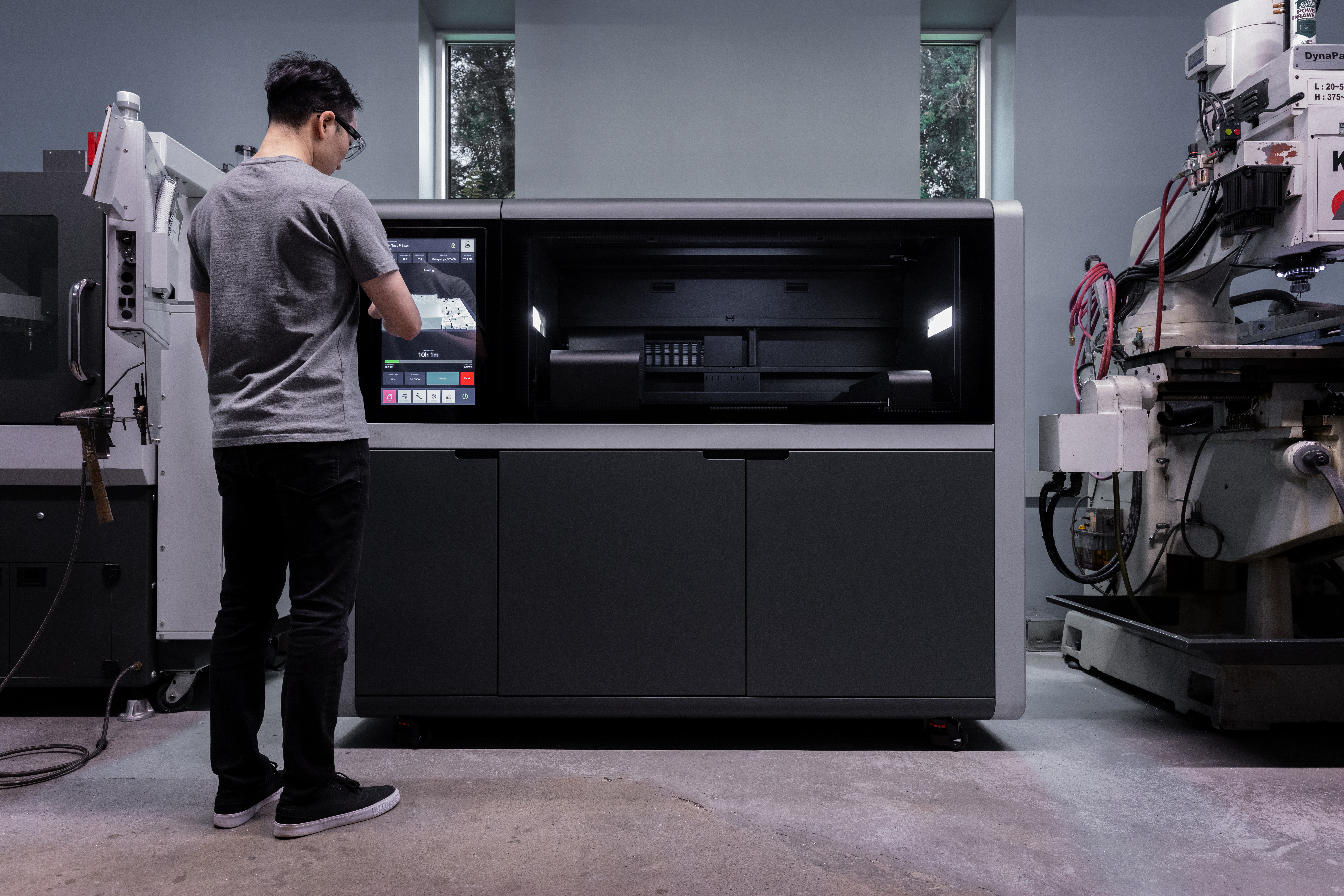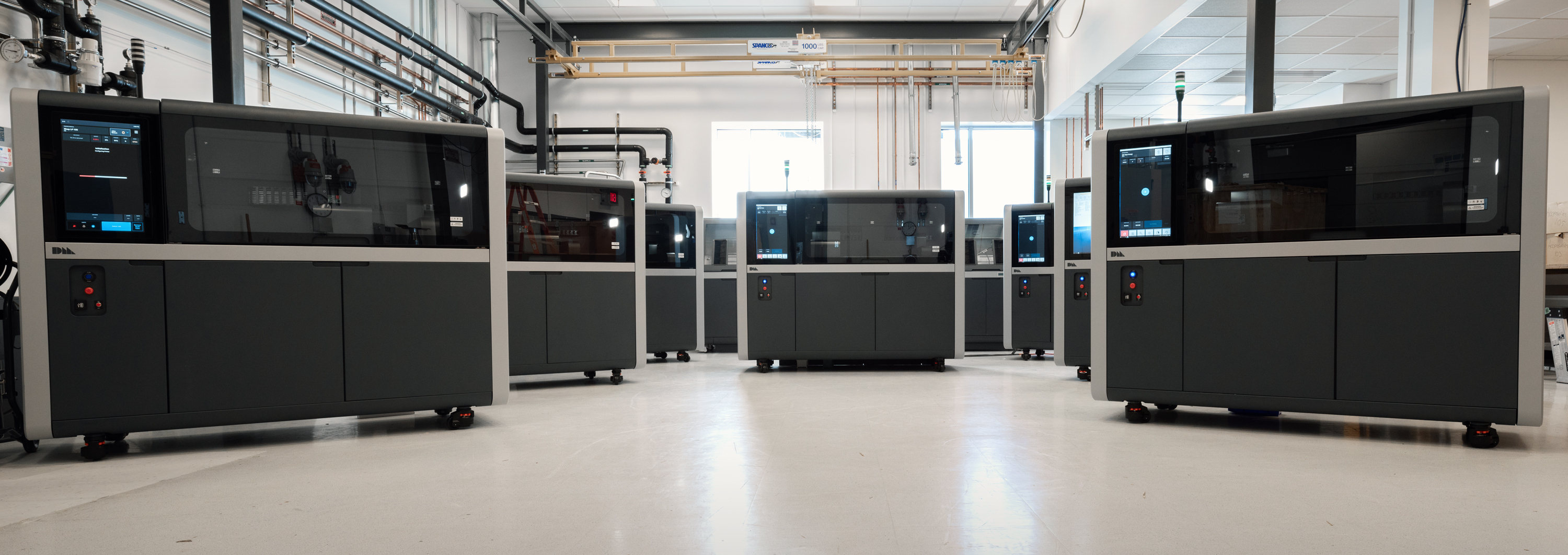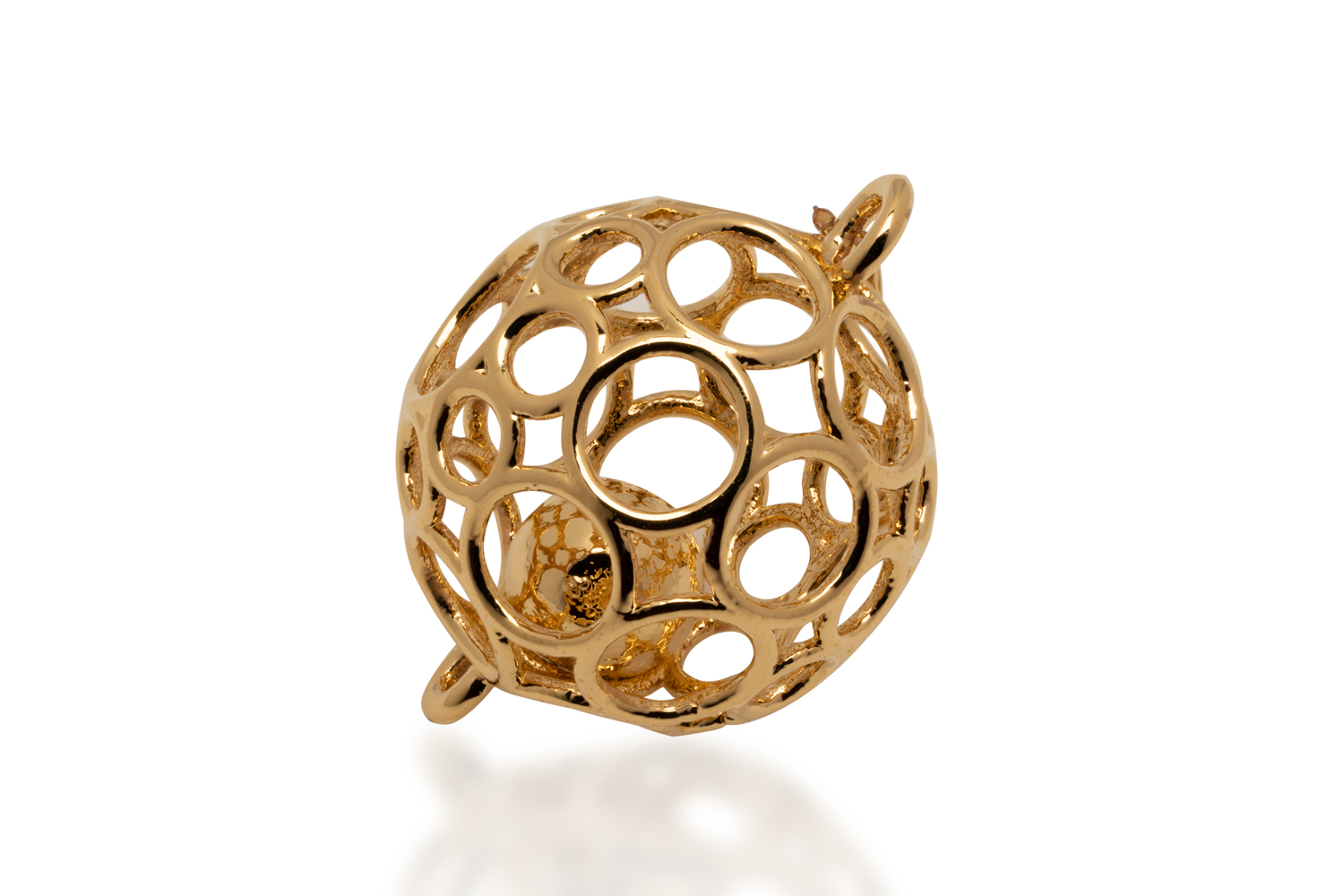Metal 3D printing company Desktop Metal has announced its Shop System is being produced in volume and shipped to customers across the globe.
First unveiled in 2019, the Shop System is a metal binder jetting system designed for machine shops, and is currently being installed in sites throughout North America, Europe, the Middle East and Africa (EMEA), and Asia-Pacific (APAC) regions.
“The Shop System offers the most cost-effective, highest-resolution mid-volume production solutions in the industry,” said Ric Fulop, CEO, and co-founder of Desktop Metal. “It’s high-speed, single-pass print engine introduces high-quality binder jetting to an entirely new market of machine shops, casting foundries, and powder metal component suppliers.”

The Shop System
Following the launches of its Studio System and Production System, Desktop Metal revealed its latest additive manufacturing machine at last year’s formnext, engineered to produce serial batches of complex, end-use metal parts quicker and cheaper than can be delivered by conventional manufacturing techniques.
The end-to-end system comprises a single pass binder jetting printer, a drying oven, a powder station with built-in powder recycling, a furnace, and integrated powder handling accessories. For ease of use, parts can be produced with a push of the button through the system’s software interface, while optimized engineered powders and processing parameters ensure part quality and repeatability.
The Shop System’s single-pass print carriage can produce complex metal parts up to 10 times the speed of legacy Powder Bed Fusion (PBF) technologies. The machine can reach speeds of up to 800 cc/hour at 75-micron layer thickness to produce batches of hundreds of printed parts in just five hours. The system’s high-resolution printhead enables parts with fine-feature detail and surface finishes as low as four-micron roughness average (Ra) to be printed. With a 1600 native DPI, the printhead can produce parts with a 400 percent higher resolution than other binder jetting systems. This allows for superior surface finishes, bleed control, and improved feature detail at high speed.
“With the Shop System, engineers and plant operators can now eliminate many of the constraints previously imposed by traditional manufacturing methods, like CNC machining, and achieve affordable, reliable, and flexible batch production of complex parts,” said Fulop.
The Shop System has variable build box configurations ranging 4L, 8L, 12L, and 16L, with pricing starting at $166,500 for the 4L printer, and up to $241,500 for the 16L. Customers will also gain access to the firm’s Fabricate MFG build preparation software and its recently released Live Sinter application, a software that simulates the sintering process in order to correct shrinkage and distortion of binder jet printed parts.

Beginning global shipments
Earlier adopters of the Shop System such as Jade Creaction LDA in Portugal, Wall Colmonoy Limited in the U.K., Alpha Precision Group in the U.S., E.A.C. in France, and Hong Kong Productivity Council (HKPC) in Hong Kong, have all leveraged its binder jetting technology to produce high-volume end-use metal parts.
Specializing in luxury goods such as jewelry and watches, Jade Creaction has utilized the Shop System to fulfill its customer’s requirements more quickly, and according to CEO Christophe Pereira the technology has allowed “freedom from multi-stage manufacturing tooling” to give its clients’ designers greater creative power. Meanwhile, fellow luxury goods manufacturer E.A.C has taken advantage of the binder jetting system to mass-produce parts with intricate geometries.
“E.A.C. has been exploring metal binder jetting technology over the past four years,” explained manager Patrick Chouvet. “After a comprehensive review and benchmarking of the competitive landscape, we chose the Desktop Metal Shop System for its unparalleled print quality, throughput, and affordability.”
Elsewhere, engineered powder metal and metal injection molding provider Alpha Precision Group (APG) is integrating the Shop System to facilitate the production of components which aid in reducing emissions, improve fuel economy, and enhance engine performance within the automotive sector. According to Phillip McDonald, an advanced engineering engineer at APG, the Shop System will change the way engineers think, “not just from a manufacturing perspective but from a limitless design perspective.”
He continued: “This technology enables our customer to iterate designs extremely quickly and prototype products with no tooling costs, all with incredibly short lead times. The future is here.”
Impac Systems Engineering (ISE), a Texas-based professional engineering services firm, believes the Shop System will allow it to scale “to hundreds of near-net shaper parts daily,” and will significantly reduce labor costs. Also on board is the VTT Technical Research Center, based in Finland, which will use the binder jetting technology to facilitate its exploration of new materials to widen its metal additive manufacturing materials portfolio. In France, CETIM, the Technical Centre for Mechanical Engineering Industry, believes the technology will open doors to new opportunities within the field of mechanical engineering innovation and research and development (R&D).
“Desktop Metal technologies, including the new Shop System, completes our additive manufacturing machine park,” said Pierre Chalandon, COO for materials, processes, and industrialization at CETIM. “We chose to be one of the first Shop System adopters because we are convinced it is now possible for metal binder jetting to decrease the global cost, increase the production rate, increase the quality and definition and accuracy, develop new materials, and simulate the process – especially sintering – to control the capability and quantity.”

Achieving Additive Manufacturing 2.0
According to Desktop Metal, an “Additive Manufacturing 2.0 revolution” is underway to reshape the future of manufacturing, of which its Shop System will play an integral role. Additive Manufacturing 2.0 refers to the notion that throughput, repeatability, and part costs achieved through 3D printing can compete with conventional manufacturing processes. Reportedly, the 3D printing sector is expected to rocket to an estimated value of $146 billion by the end of the decade.
“Many of the benefits that have long been touted for 3D printing – mass customization, complex geometries, lightweighting, assembly consolidation, tool-free manufacturing, digital inventories, and more – all come bundled as part of AM 2.0,” Fulop explained. “Taken together, this suite of benefits represents a new approach to the way metal parts are being designed, prototyped and now, with the Shop System, manufactured.”
The availability announcement of the Shop System follows Desktop Metal’s recent move to go public with its 3D printing business after agreeing to merge with blank check company Trine Acquisition Corp. The move will see it listed on the NYSE with an estimated equity value of $2.5 billion. 3D Printing Industry investigated what this transaction could mean for the wider additive manufacturing industry. Most recently, Desktop Metal was awarded a three-year $2.45 million dollar project from the U.S. Department of Defense (DoD) to develop a high-volume 3D printing process for the mass production of Cobalt-free hardmetals.
Subscribe to the 3D Printing Industry newsletter for the latest news in additive manufacturing. You can also stay connected by following us on Twitter and liking us on Facebook.
Be sure to subscribe to the Another Dimension podcast on your chosen podcast player to make sure you never miss an episode.
Looking for a career in additive manufacturing? Visit 3D Printing Jobs for a selection of roles in the industry.
Featured image shows the Desktop Metal Shop System, reportedly the world’s first metal binder jetting system designed for machine shops, is being manufactured in volume and shipped to customers around the world. Image via Desktop Metal.



